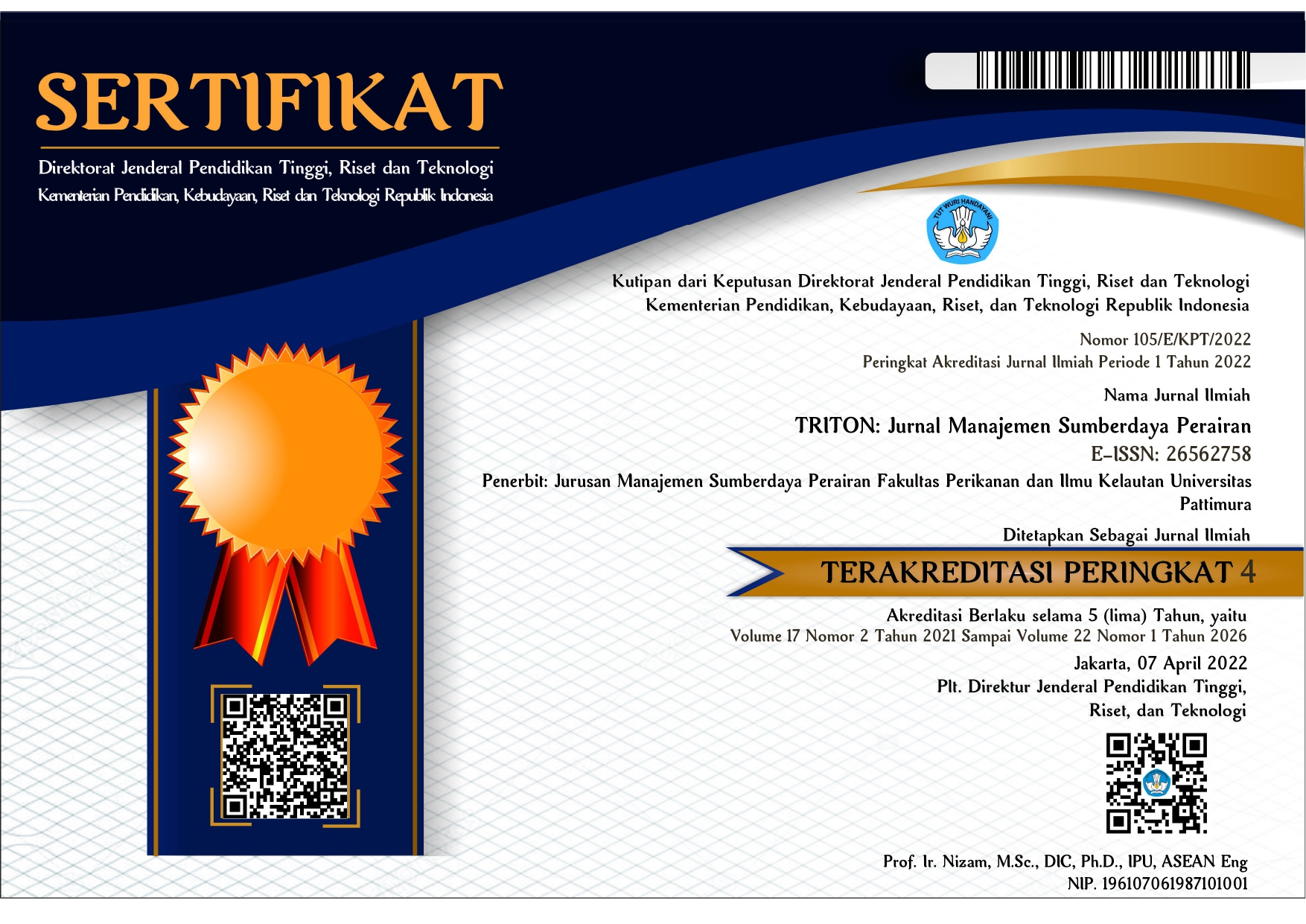Directorate General of Research and Development Strengthening, Ministry of Research, Technology and Higher Education of Republic of Indonesia, in rank SINTA 4, according Decree No.: 105/E/KPT/2022.
Publication Ethics
TRITON: Jurnal Manajemen Sumberdaya Perairan is committed to upholding the highest standards of publication ethics and academic integrity. We fully adhere to the principles and best practices set forth by the Committee on Publication Ethics (COPE). Any form of unethical behavior, including plagiarism, data fabrication, falsification, and fraudulent publication, is unacceptable and will be addressed rigorously. Our comprehensive ethics statement is outlined below.
A. Duties of Authors
1. Originality and Plagiarism:
Authors must submit original work. All sources used must be appropriately cited or quoted. Plagiarism in any form constitutes unethical behavior and will result in immediate rejection.
2. Data Integrity and Access:
Authors must present an accurate account of the research and an objective discussion of its significance. Underlying data must be represented accurately. Fabrication, falsification, or selective manipulation of data is prohibited.
3. Multiple, Redundant, or Concurrent Publication:
Submitting the same manuscript to more than one journal concurrently is unacceptable. Publishing a manuscript describing essentially the same research in more than one journal is considered unethical.
4. Authorship Criteria:
Authorship must be limited to those who have made a significant intellectual contribution to the work. All co-authors must approve the final version of the paper and agree to its submission.
5. Acknowledgement of Sources:
Proper acknowledgment of the work of others must always be provided. Authors must cite influential publications that have shaped their own research.
6. Disclosure and Conflicts of Interest:
All authors must disclose any financial or other conflicts of interest that could influence the results or their interpretation. All sources of financial support must be disclosed.
7. Fundamental Errors in Published Works:
If an author discovers a significant error in their own published work, it is their obligation to promptly notify the journal and cooperate in retracting or correcting the paper.
8. Hazards and Human or Animal Subjects:
If the work involves unusual hazards or the use of human participants/animals, authors must clearly identify these and confirm that the study was conducted with ethical approval. A statement to this effect must be included in the manuscript.
9. Use of Generative AI and Large Language Models:
- Authorship: AI tools cannot be listed as an author.
- Disclosure: The use of AI tools (e.g., ChatGPT) must be transparently disclosed in the manuscript, specifying the tool, purpose, and extent of use.
- Accountability: Authors retain full responsibility for the entire content of their manuscript, including any AI-generated output. Failure to disclose AI use is a breach of publication ethics.
B. Duties of Editors
1. Publication Decisions:
The editor is responsible for deciding which manuscripts to publish, based on their importance, validity, and the reviewers' comments, while constrained by legal requirements.
2. Fair Play and Impartiality:
Editors must evaluate manuscripts solely on their intellectual content without regard to the authors' personal characteristics.
3. Confidentiality:
Editors and editorial staff must not disclose any information about a submitted manuscript to anyone other than the corresponding author, reviewers, and publisher.
4. Disclosure and Conflicts of Interest:
Unpublished materials from a submission must not be used in an editor's own research without the author's written consent. Editors must recuse themselves from manuscripts where they have a conflict of interest.
5. Vigilance over Published Record:
Editors will act promptly to investigate ethical misconduct and issue corrections or retractions when necessary.
C. Duties of Reviewers
1. Contribution to Editorial Decisions:
Peer review assists the editor in making editorial decisions and can help the author improve the manuscript.
2. Promptness and Professionalism:
Reviewers who feel unqualified to review a manuscript or cannot provide a prompt review should notify the editor.
3. Confidentiality:
Manuscripts received for review are confidential documents and must not be disclosed to or discussed with others.
4. Standards of Objectivity:
Reviews should be conducted objectively. Personal criticism of the author is inappropriate. Referees should express their views clearly with supporting arguments.
5. Acknowledgement of Sources:
Reviewers should identify relevant published work that has not been cited by the authors and should accompany any statement of prior reporting with a relevant citation.
6. Disclosure and Conflict of Interest:
Reviewers must not consider manuscripts where they have conflicts of interest. Privileged information obtained through peer review must be kept confidential and not used for personal advantage.

1.png)










